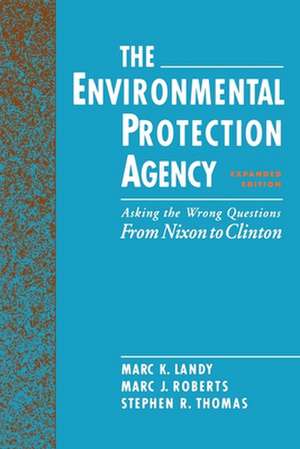The Environmental Protection Agency: Asking the Wrong Questions: From Nixon to Clinton
Autor Marc K. Landy, Marc J. Roberts, Stephen R. Thomasen Limba Engleză Paperback – 13 iul 1994
Preț: 692.95 lei
Preț vechi: 899.93 lei
-23% Nou
Puncte Express: 1039
Preț estimativ în valută:
132.64€ • 144.12$ • 111.49£
132.64€ • 144.12$ • 111.49£
Carte tipărită la comandă
Livrare economică 21 aprilie-05 mai
Preluare comenzi: 021 569.72.76
Specificații
ISBN-13: 9780195086737
ISBN-10: 0195086732
Pagini: 368
Dimensiuni: 156 x 233 x 27 mm
Greutate: 0.57 kg
Ediția:Expanded
Editura: Oxford University Press
Colecția OUP USA
Locul publicării:New York, United States
ISBN-10: 0195086732
Pagini: 368
Dimensiuni: 156 x 233 x 27 mm
Greutate: 0.57 kg
Ediția:Expanded
Editura: Oxford University Press
Colecția OUP USA
Locul publicării:New York, United States
Descriere
The Environmental Protection Agency: From Nixon to Clinton seeks to uncover the mistaken premises upon which errant policy decisions have been founded. Through its comprehensive chronicle of the agency's evolution, it uniquely and expertly depicts the serious consequences which have resulted from poor policy decisions, and discusses which questions the EPA should be encouraged to ask, and how they can be encouraged to do so. With new chapters on the Bushand Clinton administrations, it is the only comprehensive history of the EPA, tracing the agency from its founding under Nixon to its current role in the Clinton administration.
Recenzii
Two of the book's topics are of particular interest to health professionals: the use of cancer epidemiology in the formulation of public health and environmental protection policy and the connection between environmental pollution and health.
Textul de pe ultima copertă
Through careful analysis of representative cases, it evaluates the Environmental Protection Agency's performance over its entire existence, uncovers the mistaken premises that have clouded and distorted debate about environmental policy, and shows how public officials might better preserve and promote constitutional democracy.









